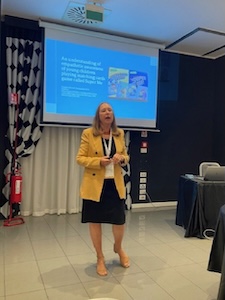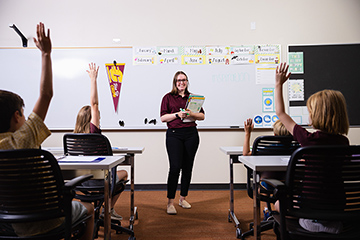Can a matching card game help study empathetic awareness in children?
Collecting data from 27 children, Professor Nowak-Fabrykowski presented her research in Bologna, Italy.
Professor Krystyna Nowak-Fabrykowski from the Department of Teacher and Special Education presented a paper, An understanding of empathetic awareness of young children playing a matching game called Super Me at the World Organization for Early Childhood Education (OMEP) International Conference in Bologna, Italy.
The goal of this research project was to investigate children’s understanding of empathetic awareness through playing Super Me!, an emotional intelligence matching card game. To play Super Me!, children take turns matching the situation to the emergency, reinforcing social skills like making good choices, helping others and having empathy.

“The development of cognitive empathy in preschool children is a big concern,” says Nowak-Fabrykowski. To collect data, 27 children, ages three and four, were interviewed, answering six questions and playing a matching card game that illustrated 16 scenarios representing empathetic acts. “The results demonstrated which scenarios were chosen by children and their understanding of the feelings of others and the need to help them.”
Nowak-Fabrykowski references Vygotsky’s theory which emphasizes that during play, the child creates a “structure of meaning” where the semantic aspect – the meaning or words or pictures – dominates and determines the child’s behavior. This captures the child’s intention to play. She adds, “play for children acts as an exercise to help them understand self-awareness, the distinction between appearance and reality, and the intentions of others.”
Congratulations to Professor Nowak-Fabrykowski! The next OMEP conference will be held in 2026 in Poznań, Poland.




